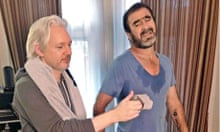A Swedish court will hold a public hearing to decide whether to lift the arrest warrant on Julian Assange that has kept the WikiLeaks founder holed up in Ecuador's embassy in London to avoid extradition over allegations of rape and sexual molestation.
Assange sought refuge in the embassy in Britain in June 2012 after exhausting all legal options in British courts to avoid being extradited to Sweden.
The legal challenge to the prosecutor was issued last month after a change to Swedish criminal procedures that brought them in line with an EU directive on the right to information in criminal proceedings. The challenge also coincided with the second anniversary of Assange seeking refuge in the Ecuadorean embassy.
Assange has acknowledged that even if the Swedish prosecutors decide to drop the case, it is only one part of the legal battle that keeps him marooned at the embassy.
"I still have the larger problem, which is that of the United States and its pending prosecution, and perhaps extradition warrant," he told reporters in a conference call in June.
The prosecutor and Assange's lawyers have rehearsed their arguments in documents lodged with court.
For Assange, Thomas Olsson and Per Samuelson argue in their latest submission this week that the allegations against Assange have insufficient basis in the plaintiffs' evidence to police, which was leaked to the Guardian in December 2010.
They also question the prosecutor's motives in refusing to question Assange in London, which they say breaks the requirement of urgency in the case, while the European warrant for his arrest is "contrary to necessity and proportionality".
The lawyers also invite the judge to watch a YouTube clip showing a montage of attacks on Assange by US politicians and officials, as evidence of the serious threats to Assange's safety should he agree to travel to Sweden.
However, the chief prosecutor, Marianne Ny, and her deputy, Ingrid Isgren, argue that "there remain sufficient grounds to believe that Julian Assange could be found guilty of the allegations made against him".
They say that the change to Swedish law does not give the suspect the right to copies of case files, while Assange's deprivation of liberty is voluntary and therefore irrelevant to maintaining the arrest warrant.
Lawyers for the two women who brought the allegations against Assange have made strongly worded criticisms of the legal challenge in the Swedish press.
Elisabeth Massi Fritz accused lawyers for Assange of making false statements about the plaintiffs and portraying the prosecutor as "a man-hating radical feminist".
The case "is about a man with the power to destroy two women's lives, set himself above the law and avoid having to answer for it. It would be a slap in the face to the plaintiffs and all women who have been victims of sexual violence if the court rescinds the warrant," she wrote in an opinion piece for Swedish daily Svenska Dagbladet.
Claes Borgström, the other lawyer for the women, said cryptically: "There are findings that no outsider knows about."
Frustration at the legal deadlock in the case has seen Swedish legal opinion at a senior level swing against the prosecutor's refusal to travel to interview Assange in London, with Anne Ramberg, head of the Bar Association, calling the impasse a "circus". Sven-Erik Alhem, a former chief prosecutor, this week accused his successor of making "thunderous errors" in the case.
The hearing starts at noon BST and is scheduled to end at 4pm. Under Swedish law, judge Lena Egelin is obliged to issue her ruling on Wednesday. The prosecutor is due to hold a press conference afterwards.







